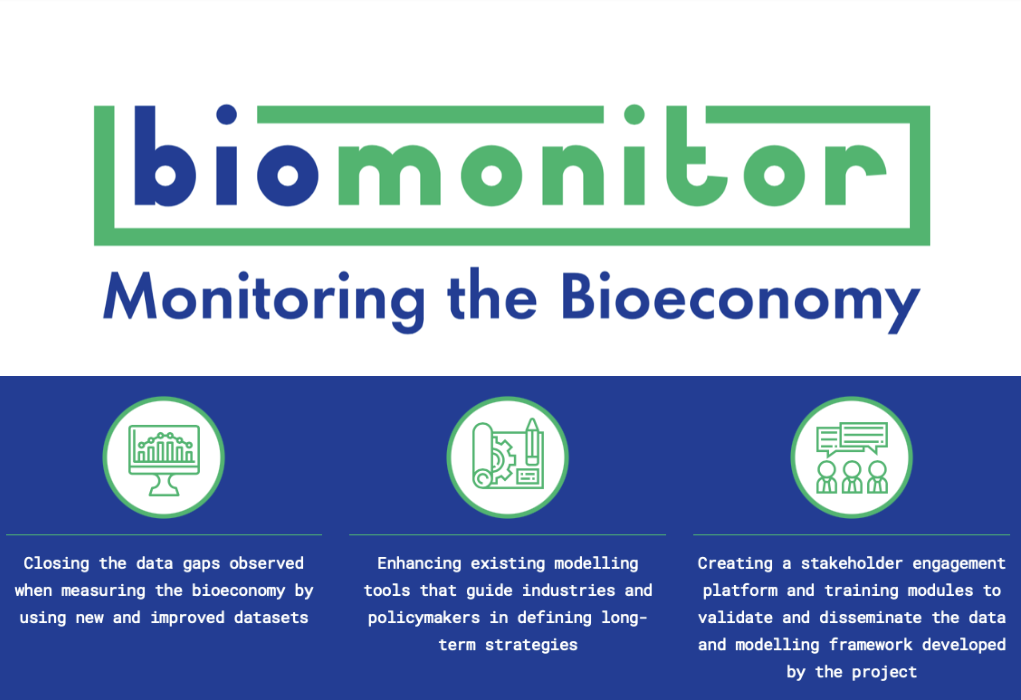Over the last twenty years, EU policy makers have prioritized the expansion of bio-based value chains through various EU policy initiatives and research programmes. Although developments show a growing popularity of the bioeconomy in Europe, related information and statistics still lag behind in various ways.
These include the lack of comprehensive databases and statistics for bio-based industries, missing transparent methodology for bio-based data collection and a lack of integrated value chain data and indicators that illustrate the flows of different bio-based materials’ processing system. Over the last four years and under the leadership of the Wageningen University, the BioMonitor Project aimed to enable professional stakeholders from different sectors to monitor and measure the bioeconomy as well as its economic, environmental and social impacts in the EU and its member states.

The project worked in a threefold approach to:
- Close the data gaps observed when measuring the bioeconomy by using new and improved datasets,
- Enhance existing modelling tools that guide industries and policymakers in defining long-term strategies,
- Create a stakeholder engagement platform and training modules to validate and disseminate the data and modelling framework developed by the project.
Threefold Approach to Provide Improved Insights in the EU Bioeconomy
Over the last four years the BioMonitor partners put in great effort to follow these three approaches and provide new and better insights in the EU bioeconomy. Following the final stakeholder meeting in early October in Brussels, where the partners reported and validated preliminary results to internal and external stakeholders, the project is heading towards its final weeks. Therefore, the research team now is happy to share its findings and final results.
The project successfully established the BioMonitor Data Platform containing dashboards of several indicators measuring the bioeconomy that are based on the data collected and developed within the project. Other notable results are six case studies on selected fields within the EU bioeconomy, including bio-based products in the chemical and wood industry, circularity in the EU bioeconomy, and socio-economic impacts of the EU bioeconomy.
To paint a more exhaustive picture of the EU bioeconomy despite the challenging data situation, the BioMonitor partners also developed several policy briefs and conducted modelling activities. These also provide an outlook on what is yet to come in the field of bioeconomy and the related policy framework. All deliverables produced in order to report the intermediate and final results are available online on the project’s website.
If you would like to find out more about the BioMonitor project, contributing partners and especially the final results, please visit the official project website: http://biomonitor.eu
The BioMonitor project has received funding from the European Union’s Horizon 2020 research and Innovation programme under grant agreement N°773297.
About nova-Institute
nova-Institute is a private and independent research institute, founded in 1994; nova offers research and consultancy with a focus on the transition of the chemical and material industry to renewable carbon: How to substitute fossil carbon with biomass, direct CO2 utilisation and recycling. We offer our unique understanding to support the transition of your business into a climate neutral future. nova-Institute has more than 40 employees.
Source
nova-Institute, press release, 2022-11-30.
Supplier
European Union
Horizon 2020
nova-Institut GmbH
Share
Renewable Carbon News – Daily Newsletter
Subscribe to our daily email newsletter – the world's leading newsletter on renewable materials and chemicals










